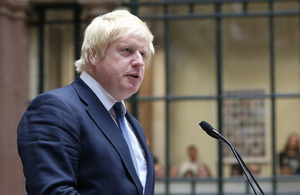Foreign Secretary to attend NATO meeting of Foreign Ministers
Acting UK Ambassador to NATO, Paul Johnston, announces that Foreign Secretary Boris Johnson will join the NATO meeting of Foreign Ministers on 6-7 December in Brussels.

Foreign Secretary Boris Johnson
It’s an understatement to say a lot has happened since NATO Foreign Ministers met last May. NATO’s Warsaw Summit two months later came just after our historic EU referendum and just before the coup attempt in Turkey.
In the Western Balkans we have seen attempts to destabilise Montenegro, soon to become NATO’s 29th Ally. In Ukraine Russian interference also continues. Despite the horrific scenes in Aleppo, the fight against Daesh is making progress, in Iraq and Syria. In Afghanistan another tough fighting season is drawing to a close.
So NATO has a lot on its agenda as Foreign Ministers gather this week for their bi-annual meeting: our Foreign Secretary’s first and the last for his US counterpart.
For the UK, NATO remains the enduring and essential Alliance, as the Foreign Secretary made clear in his Chatham House speech last week. NATO has been top of the agenda for our Prime Minister in her initial conversations with President-elect Trump.
There will be much focus on EU Article 50 next year. But NATO Article V will remain the corner stone of UK national security, European security and international security.
That’s why we’re leading the new NATO forward presence in Estonia, sending fighter planes to Romania, extra troops to Kosovo and Afghanistan, naval assets to the Mediterranean and Aegean, spending 2% of GDP on defence and renewing our independent nuclear deterrent.
NATO is the embodiment of the interests and values we share with our European and North American allies. We thought we shared them with Russia, but the Ukraine intervention showed otherwise. As our leaders agreed at Warsaw, and as the Foreign Secretary reiterated last week, we want dialogue with Russia but from a position of strength and principle.
So it’s fitting that Foreign Ministers will discuss the challenge posed by Russia, also in the context of a forward-looking discussion about how we take forward a stronger Alliance together. Ministers will also meet the Ukrainian Foreign Minister to reaffirm NATO’s support and to underline the importance of reform and of implementation of Kiev’s commitments under the Minsk agreement.
Ministers will meet with the EU’s High Representative and with the Foreign Ministers of Sweden and Finland, in a session devoted to NATO-EU co-operation. Taking forward the package of work agreed by the Secretary-General and his EU counterparts at the Warsaw Summit, we welcome the concrete proposals for working together on cyber, maritime security and hybrid threats.
The EU recognises NATO as the cornerstone of European Defence. And the Alliance acknowledges the importance of stronger European efforts on security, in NATO and the EU. As UK Ministers have said, Europeans spending more and meeting the NATO 2% target is the best way to show we’re serious about this.
The Western Balkans is an area where NATO and the EU have worked well in the past and the challenges in the region requires us to intensify that co-operation in the years ahead. Similarly, in the Aegean sea and the central Mediterranean, NATO and the EU are working together to tackle shared security challenges. This agenda of “Projecting Stability” - NATO working with others to address the complex security problems to the East and South of the Alliance - will also feature at the Ministerial meeting.
Finally, the Alliance will discuss Afghanistan, still its biggest mission, with the Afghan Foreign Minister and other key contributors. The Alliance agreed at Warsaw to maintain a sizeable presence in Afghanistan through its Resolute Support Mission. NATO’s only ever invocation of Article V was in response to 9/11. Europeans have contributed hugely to the NATO’s efforts to defeat terrorism in Afghanistan, alongside our North American Allies, many partners and the Afghan forces. Their valiant efforts and shared sacrifice are the ultimate expression of the bonds that unite us across the Atlantic; bonds which our Ministers will, I’m sure, celebrate and strengthen at their meeting this week.